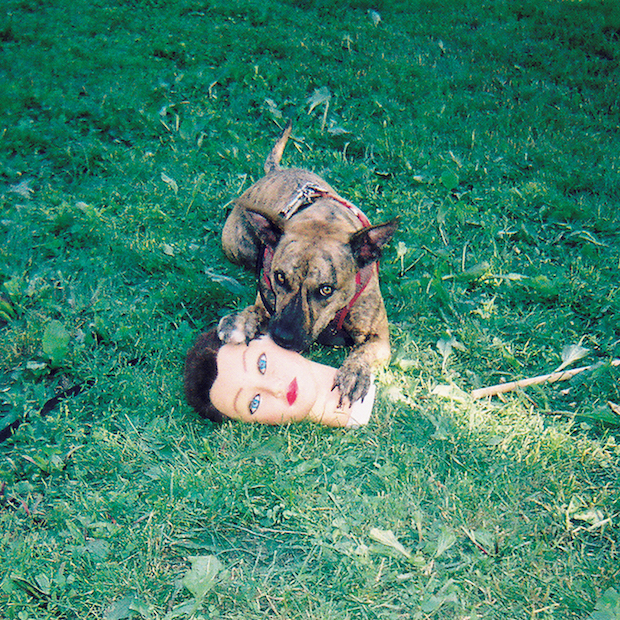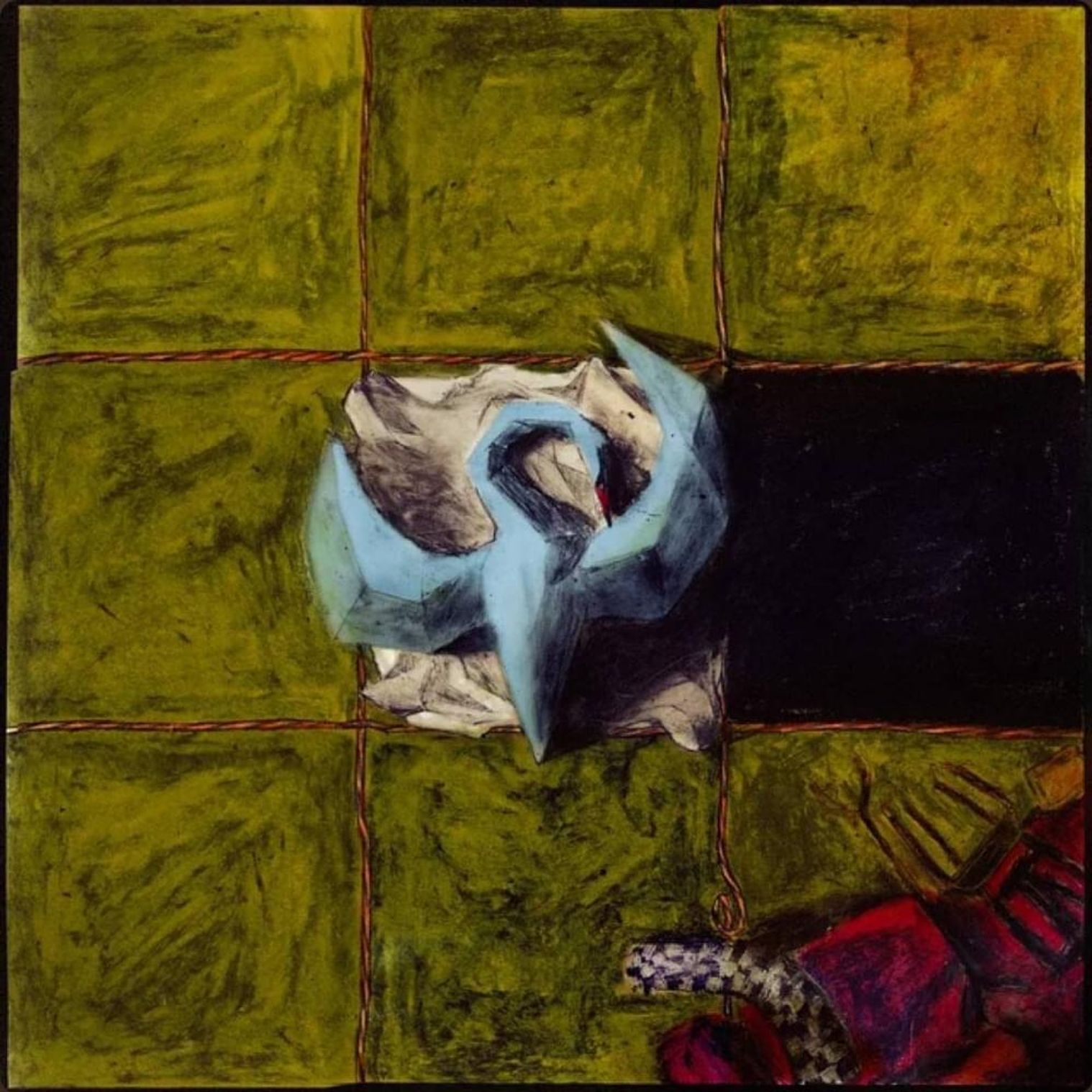There's such a beautiful little irony to the realization that the guy from Fun. is singing backup for the guy from Joyce Manor. The guy from Joyce Manor is Barry Johnson, who, since 2008, has specialized in finely observed and wistful little lyrical details, and who has crammed those details into songs that often clock in at under 90 seconds. Joyce Manor are a pop-punk band, at least in theory, but they've only really glancingly nodded at the "pop" side of that equation. They sing about relationships and sentimentality and being a completely lost young person, the way pop-punk bands do. But their songs are brief and headlong rushes -- LPs ending in under 20 minutes, songs that barely ever bother to repeat the chorus twice. And Johnson's voice is not exactly a melodic instrument. It's a strangulated blurt -- capable of conveying emotion but not really the sort of thing that can pound a hook home.
The guy from Fun., meanwhile, is Nate Ruess. (Usually, when we talk about a guy from Fun. on this site, it's Jack Antonoff. Not this time. This time, it's Nate Ruess.) Ruess is a big deal. He's had a #1 hit. He's sung the hook on an Eminem track. And whatever you think of Fun.'s songs (I think they're pretty good, generally), the man can sing, in that blown-out, operatic, Freddie Mercury Jr. kind of way. And yet here Ruess is, on Joyce Manor's fourth album, Cody, singing ahh-ahh backing harmonies and buried deep in the mix. (The album's two credited backing vocalists are Ruess and Phoebe Bridgers, a Los Angeles singer-songwriter who opened for Julien Baker on tour pretty recently.) It's an odd pairing, but it makes its own kind of sense. Cody immediately registers as Joyce Manor's best album, and it achieves that distinction, in part, by cleaning up the band's sound and giving it some melodic focus. You can't really do that if Barry Johnson is the only guy on the mic the whole time. Ruess' parts are minor, but they make a big difference, and plus it's fun to think about him being on this album.
It might be a stretch to think of Ruess taking a supporting role on the album, but it's not that shocking to think about him being on the album. Joyce Manor are, within their own world, an important band, one with a real fanbase. They're four albums deep into their career (even if all those albums could fit onto a single CD). They play big rooms. They generated a whole lot of punk-scene controversy a couple of years ago when they asked fans not to stagedive at their shows. A year and a half ago, I watched them draw a not-bad crowd to a Coachella mainstage -- something that not too many guitar-driven acts at that festival can accomplish. But more to the point, they've done all this while playing a defiant, hard-edged, willfully obtuse, and personal form of pop-punk -- a genre that's fallen from commercial dominance in the past decade or so -- and proved that there's still plenty of life in the form. Pop-punk didn't need saving; there are hundreds of bands out there in the Bandcamp hinterlands putting their absolute hearts into it with no thought of becoming Blink-182 or Fall Out Boy. But for those of us who have largely lost touch with the stuff, it's great to see a band finding new, creative things to do with that sound and, as a result, blowing the fuck up.
And now Joyce Manor finally sound like a band who have blown the fuck up, who have real resources to make their sound bigger and better. Maybe there's a contradiction in cheering for a knotty, idiosyncratic band to become poppier and more accessible, but on Cody, Joyce Manor make the leap, and they do it without compromising the things that made them special in the first place. The version of Joyce Manor we hear on Cody is one that's comfortable enough to record a four-minute song, or to let its album's runtime creep past the 25-minute mark. Their hooks are bigger and sharper and cleaner. Rob Schnapf produced the album, and he's an old hand at cleaning up underground sensations and making them bigger and cleaner. (He co-produced Mellow Gold for Beck and Either/Or and XO for Elliott Smith. He knows what he's doing.) And finally, rather than bashing their way through the songs like they can't wait for them to be over, Joyce Manor have slowed down and given their whole attack room to breathe. They pull neat little production tricks, like adding a tambourine when the second verse comes in. They have bits that get stuck in your head now. That's something new.
And the bits that you get stuck in your head are also the ones that flex Barry Johnson's deep and specific lyrical powers. This one, from the album opener and first single "Fake ID" has been sticking with me since I first heard it: "What do you think about Kanye West? / I think that he's great, I think he's the best / Yeah, I think he's better than John Steinbeck / I think he's better than Phil Hartman." He's not singing from his own perspective; he's inhabiting the sort of drunken chatter you can hear on a night out, the lines that rattle around in your head even when the rest of the night is a blur. And a minute after singing about Kanye, he's singing about a friend who died. Other times, he's more direct, as on the fluttering acoustic please-stay reverie "Do You Really Want To Get Better?": "Could you see me in your life? Could you try?" Or he's interrogating his own failings and being utterly merciless about it: "I’m 26 and I still live with my parents / Oh, I can’t do laundry / Christ, I can’t do dishes / What’ll I do without you?"
That song about being 26 is "Stairs," the longest-ever Joyce Manor song at four minutes and change. It might be the most complicated, too. It ends with Johnson, or his character, telling a loved one some disturbing things: "I'll lock you in my room / And I'll tie you to the sheets / Cuz I could watch you sleep for weeks." It's a big, messy, tangled-up, confused sentiment, and I'm pretty sure Johnson understands that it's wrong. But Joyce Manor have found a way to make that messiness sting and resonate. Cody might present a cleaned-up version of this band, but this is a band that can only clean up so much, no matter who's singing backup.
Cody is out 10/7 on Epitaph.
[videoembed size="full_width" alignment="center"][/videoembed]
[videoembed size="full_width" alignment="center"][/videoembed]
Other albums of note out this week:
• Phantogram's purposeful pop LP Three.
• Hiss Golden Messenger's warm, scraggly roots-folker Heart Like A Levee.
• Green Day's charged-up return Revolution Radio.
• Goat's percussive psych-rock party Requiem.
• Xylouris White's instrumental psych-folk exorcism Black Peak.
• Balance And Composure's emotive, expansive Light We Made.
• Springtime Carnivore's skeletal, blissed-out Midnight Room.
• Thor & Friends' self-titled percussion-party debut.
• Norah Jones' return to jazz-pop Day Breaks.
• GTA's giddy, guest-heavy Good Times Ahead.
• NOFX's reliably hooky and sardonic First Ditch Effort.
• Matt Kivel's diffuse, free-floating Fires On The Plain.
• L'Orange and Mr. Lif's rap collab The Life And Death Of Scenery.
• MV & EE's pastoral psych-folker Root/Void.
• Lewis Del Mar's spacily sunny self-titled debut.
• Meshuggah's deep math-metal churn The Violent Sleep Of Reason.
• The Westerlies' self-titled brass-quartet debut.
• OneRepublic's studio-pop ballad-fest Oh My My.
• The soundtrack to The Birth Of A Nation.
• The '80s-pop tribute compilation The Time Is Now.
• Chrysta Bell and David Lynch's collaborative EP Somewhere In The Nowhere.
• Lushlife's No Dead Language EP.
• Wild Pink's 4 Songs EP.
• Hazel English's Never Going Home EP.






